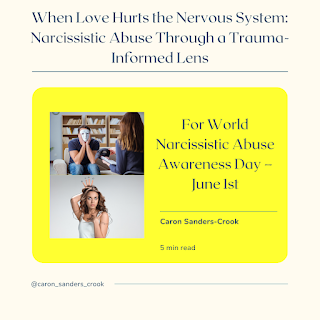When Love Hurts the Nervous System: Narcissistic Abuse Through a Trauma-Informed Lens
.png)
When Love Hurts the Nervous System: Narcissistic Abuse Through a Trauma-Informed Lens For World Narcissistic Abuse Awareness Day – June 1st We often hear that love is patient, kind, and safe. But for many, love has also been confusing, consuming, and deeply unsafe. On World Narcissistic Abuse Awareness Day , we pause to honour those whose lives have been silently shaped by the invisible bruises of emotional manipulation and chronic control. This kind of abuse doesn't always leave visible scars. But it leaves deep, neurological imprints , especially on the nervous system. What Is Narcissistic Abuse? Narcissistic abuse isn’t simply about being with someone who’s self-absorbed or vain. It's a form of emotional and psychological abuse inflicted by someone exhibiting narcissistic personality traits or full-blown Narcissistic Personality Disorder (NPD). At its core, narcissistic abuse is about control, exploitation, and eroding your sense of self , often so subtly that you begi...
.png)
.png)

.png)
.png)
.png)
